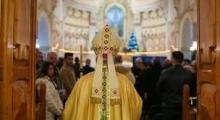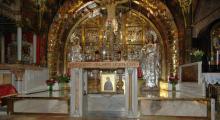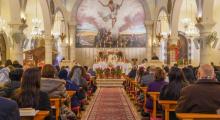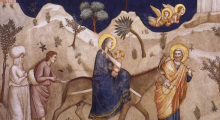Issued by the Catholic Center for Studies and Media - Jordan. Editor-in-chief Fr. Rif'at Bader - موقع أبونا abouna.org
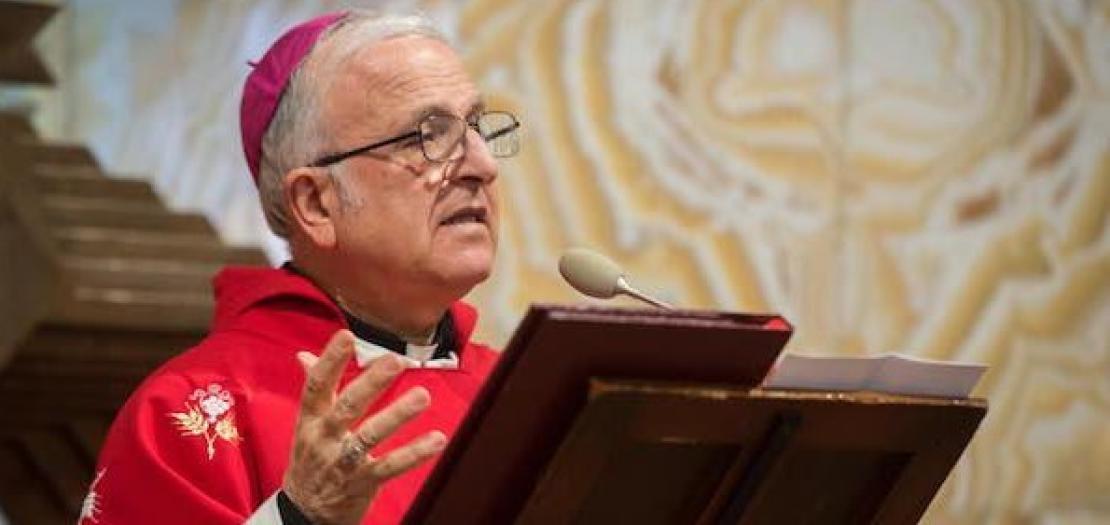
Throughout the Advent season, the word "salvation" is repeated often. And we also hear the word "Savior" and of a God saving humanity - those who seek and long for this salvation.
To receive this salvation, a collaboration must take place between our free will and God’s salvific will: The one who created humanity without their consent desires to save them only through their free and willing participation.
We find an example of this collaboration between both God’s will and the Human will, in the words pronounced by the Virgin Mary on the day of the Annunciation.
The Angel appeared to her, announcing that she would become the mother of the Savior, declaring that she would conceive and give birth to a child who would be called Emmanuel. Mary did not fully understand the Angel’s message, but with humility and faith, she pondered and inquired. Ultimately, Mary responded with the words: “Behold, I am the handmaid of the Lord. May it be done to me according to your word.” These words exemplify a resounding "yes," reflecting her free and active response to God’s call to become the mother of the Word—the God who would take on flesh through her.
This idea applies to us too! Salvation is impossible without our free and active participation.
To explain this further, let's consider the story of Zacchaeus as an example of this partnership between God and humanity.
Zacchaeus was a tax collector, chief of tax collectors, and a sinner, yet he was seeking salvation. He had heard that Jesus of Nazareth, a friend of tax collectors who forgives sins, was coming to the city of Jericho, his hometown. Jesus’ arrival in Jericho was not a random coincidence; He was searching for Zacchaeus, the lost sought-after sheep of the flock.
How did this partnership take place?
Jesus decided to come to Jericho, and Zacchaeus chose to see Him. When Jesus neared Zacchaeus’ house, he realized that his short stature would prevent him from seeing the Savior. So, he climbed a sycamore tree, and then Jesus saw him.
Zacchaeus wanted to invite Jesus to his home...but how could he make this happen? How could he extend such an invitation? But Jesus understood, for He knows the thoughts of Man's heart, and said to him: “Come down quickly, for today I must stay at your house.” (Luke 19:5) Zacchaeus joyfully welcomed Jesus, he hosted a great feast, inviting other tax collectors—sinners like himself.
Then Jesus proclaimed, “Today salvation has come to this house". (Luke 19:9) As a response, Zacchaeus gave half of his possessions to the poor, and if he had extorted anything from anyone, he repaid it four times over.
Notice here that every action taken by Jesus was met with a corresponding step from Zacchaeus. And every small step taken by Zacchaeus was met with an even greater step from Jesus... Here we witness the convergence of the two wills.
What was the outcome?
Zacchaeus was reconciled with God, with the community that had once rejected him, with the poor he had wronged and stolen from, and with himself. He found the inner peace he could never experience when he had so much wealth. In the end, Zacchaeus reclaimed the true meaning of his name. His name, which means "pure," "innocent," and "righteous," now became a reflection of his transformation—though he had once been a sinner. By returning to God and to his true self, he became worthy of that name, fully embodying its meaning.


